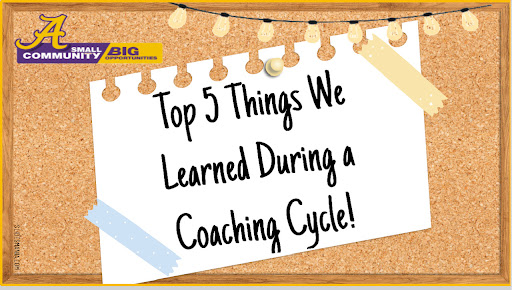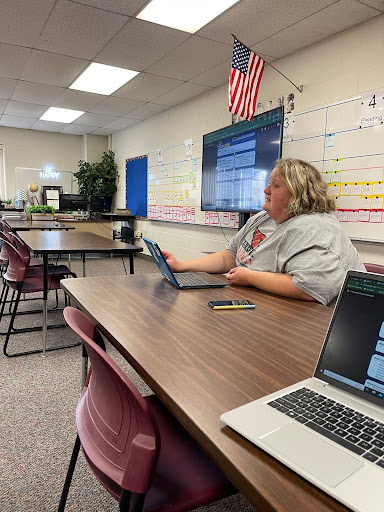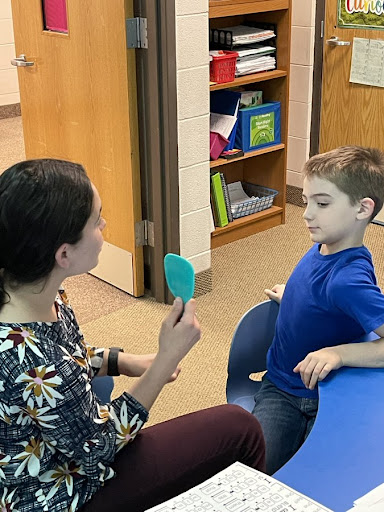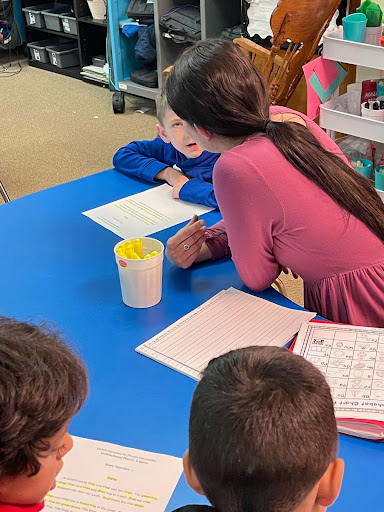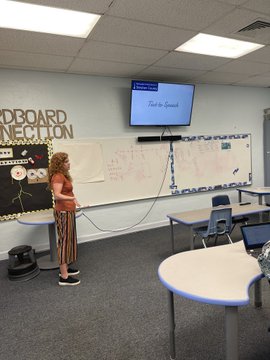As educators, we know our job is to impart knowledge to our students and continuously learn and grow ourselves. However, sometimes there are not enough hours in the day to do everything we need to do, including reflecting on our practice and learning from others. This is where instructional coaching can be incredibly valuable. Instructional coaches can tailor professional development to the specific goals of individual educators. Because an instructional coach might invest a lot of time working with one teacher for several weeks, it is crucial to look for ways to make the learning that is happening visible to a larger community of educators. In doing this, the coach can facilitate the growth of leadership capacity during coaching cycles by amplifying the teacher’s voice in various ways.
Amplifying Voices through Reflective Practice
One of the most impactful opportunities we build into coaching cycles is time for reflective practice. Reflection allows teachers and coaches to debrief from the hustle and bustle of a lesson or instructional block. There is so much orchestration and decision-making that goes into our instructional time. Poignant conversations can emerge from reflection.
After reflecting, teachers and coaches feel empowered to adjust plans to best meet the needs of their students in the future. This process builds capacity in overall classroom leadership and often transfers into exchanges with colleagues in the hallway, at staff meetings, and during professional development sessions.
We utilize protocols to make the time for reflection meaningful, yet concise. Although we use various protocols, below are three different approaches to reflection coach/teacher teams tend to gravitate towards the most. We use timers for all of these sessions to ensure we respect the educator’s many responsibilities. These reflective strategies don’t necessarily happen daily, but will occur several times throughout a coaching cycle.
“After reflecting, teachers and coaches feel empowered to adjust plans to best meet the needs of their students in the future.”
#1 Free Writing (20 Minutes)
Shortly after time spent together during an instructional period, the teacher and coach set aside time to write about what they experienced. Writing might take the form of lists, paragraphs, phrases, etc. All forms of documentation are lovely, as long as the teacher and coach can verbalize their ideas when it is time to get to the sharing portion of this protocol.
- Step 1: Write fast and furiously about noticings, concerns, and questions you had during the lesson or several lessons. (5 Minutes)
- Step 2: The teacher shares overall takeaways from the free writing they did. (5 Minutes)
- Step 3: Roles switch, and the coach shares takeaways. The coach pays extra attention to similar threads the teacher brings up in their takeaways. (5 Minutes)
- Step 4: The teacher and coach work together to identify commonalities and strategies to support areas addressed in the free write. (5 Minutes)
#2 Notice and Wonder (15 Minutes)
Notices and wonders phrases are used as sentence starters for conversing about an instructional period. They are a great way to understand the rationale, elicit questions, and build a non-judgemental stream of discourse.
- The teacher and coach use a T-chart to list their notices and wonders. (4 Minutes)
- The teacher shares their notices and wonders, and the coach listens. (3 Minutes)
- The coach shares their notices and wonders, and the teacher listens. (3 Minutes)
- The teacher and coach identify any noticings or wonders that might need their attention and brainstorm ways to address them. (5 Minutes)
#3 Question-Driven Debriefs (15 Minutes)
Question-driven debriefs are safe spaces to create dialogue based on questions from observations during instructional time. During a coaching cycle, teachers and coaches observe each other teach. Throughout the observations, many questions pop up during the instructional time. This protocol allows the teacher and coach better to understand instructional moves and decisions throughout the lesson.
- The observer asks questions about instructional decision-making.
- The teacher/coach answers those questions with rationale and evidence of effectiveness.
Amplifying Voices through Professional Learning
As an instructional coach, I constantly look for ways to capitalize on teachers’ strengths so they can add even more value to our district or the overall profession. Because teachers are in the trenches daily, their words hold much power. Teachers are highly respected by each other and understand the day-to-day challenges, so it is essential to hear their voices during professional development.
Whenever I work with a teacher, we both walk away having learned something. Frequently, these takeaways benefit an entire school staff or district. When this is the case, I reach out to the building principal and central office administrators to share the learning that is taking place. When doing this, I ask if the learning aligns with the school or district improvement plan. Most of the time, it does, so I encourage teachers to share the information they are learning with their school or district community. There have also been opportunities where teachers can share on a larger scale at conferences or state-wide panels.
At times, this might be out of a teacher’s comfort zone. When this is the case, I enjoy co-presenting with teachers or finding a creative way for them to share their message in a safer space. There is always new learning on the part of the coach and teacher that needs to be celebrated in some capacity.
However, the timing is only sometimes suitable for a teacher to share the learning from a coaching cycle. Because of this, a teacher might have the opportunity to share at a different time during the year because they have impactful learning experiences to share with the masses.
“Teachers work incredibly hard, and instructional coaching cycles can be intense. The transformation that can occur during a cycle is genuinely remarkable.”
Teachers work incredibly hard, and instructional coaching cycles can be intense. The transformation that can occur during a cycle is genuinely remarkable. As instructional coaches, it is our responsibility to ensure we make their work visible to the overall teaching profession. Hearing practical strategies that benefit students straight from the teacher’s perspective is more powerful than it will ever be coming from an instructional coach.
Resources
Please login or register to claim PGPs.
Alternatively, you may use the PGP Request Form if you prefer to not register an account.


